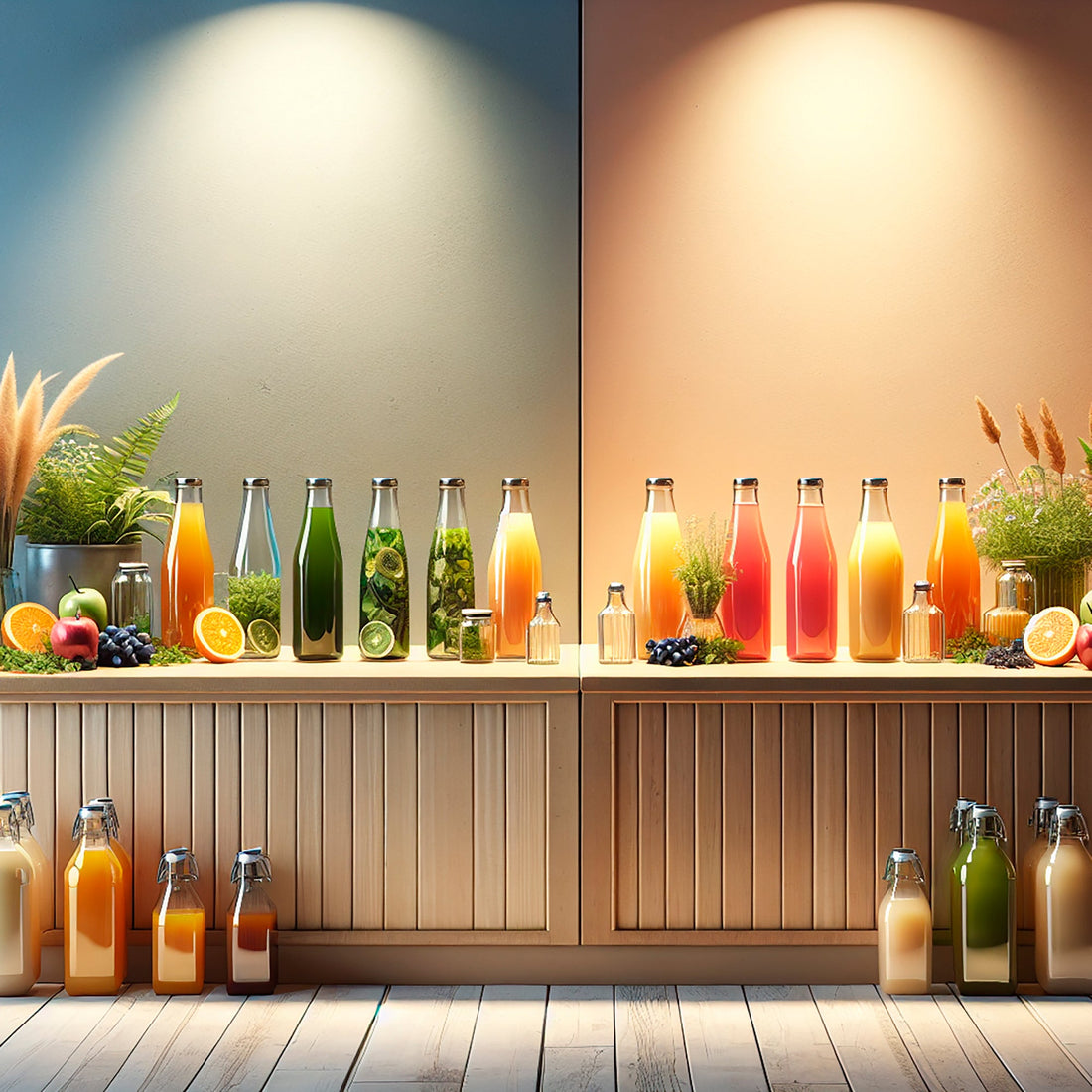
"Glass vs Plastic Bottles: Juice Storage Pros & Cons"
The article discusses the **advantages and disadvantages of glass and plastic bottles for juice storage**, highlighting their impact on **sustainability, carbon footprint, and juice quality**.
1. **Glass Bottles:**
- *Advantages*:
- They are made from natural materials and do not leach chemicals into juice, ensuring purity and safety.
- They are infinitely recyclable without losing quality, making them environmentally friendly.
- They offer a sense of sophistication, enhance juice presentation, and are more durable than plastic bottles.
- They maintain carbonation and scent and do not release or absorb any flavors, odors, or chemicals.
- *Disadvantages*:
- They are heavier and more expensive to transport and produce than plastic bottles, increasing carbon footprint and costs.
- They are fragile and require careful handling and storage.
2. **Plastic Bottles:**
- *Advantages*:
- They are lightweight, unbreakable, and less expensive to produce than glass bottles.
- Their lightweight nature makes transportation cost-effective and potentially reduces the carbon footprint.
- They can be designed with various closure mechanisms and branding, allowing for creative packaging solutions.
- *Disadvantages*:
- They are less environmentally friendly to manufacture and can only be downcycled, eventually becoming non-recyclable waste.
- Their production exposes workers to harmful vapors and chemicals and they can contain toxic substances like BPA.
3. **Environmental Impact and Sustainability**:
- *Plastic Bottles*: They contribute significantly to carbon dioxide emissions and pose a threat to marine life and ecosystems due to their long degradation time and recycling challenges.
- *Glass Bottles*: Despite being energy-intensive to produce, they offer a more environmentally friendly option due to their recyclability.
4. **Consumer Preferences and Market Trends**:
- Consumer preferences have shifted towards glass packaging due to its environmental friendliness and health benefits.
- The glass bottles and containers market is projected to grow significantly, aligning with the wellness brand ethos of prioritizing natural and organic products.
5. **Conclusion**: The choice of packaging material is crucial in aligning with the ethos of sustainability and preserving juice quality. Glass, with its superior recyclability and lack of chemical interaction, aligns with brands' commitment to offering the best, natural, and organic products. However, the practical advantages of plastic, including its lightweight nature and lower initial production energy, are counterbalanced by environmental and health concerns. Therefore, a balanced and thoughtful choice that supports wellness and environmental stewardship is necessary.
1. **Glass Bottles:**
- *Advantages*:
- They are made from natural materials and do not leach chemicals into juice, ensuring purity and safety.
- They are infinitely recyclable without losing quality, making them environmentally friendly.
- They offer a sense of sophistication, enhance juice presentation, and are more durable than plastic bottles.
- They maintain carbonation and scent and do not release or absorb any flavors, odors, or chemicals.
- *Disadvantages*:
- They are heavier and more expensive to transport and produce than plastic bottles, increasing carbon footprint and costs.
- They are fragile and require careful handling and storage.
2. **Plastic Bottles:**
- *Advantages*:
- They are lightweight, unbreakable, and less expensive to produce than glass bottles.
- Their lightweight nature makes transportation cost-effective and potentially reduces the carbon footprint.
- They can be designed with various closure mechanisms and branding, allowing for creative packaging solutions.
- *Disadvantages*:
- They are less environmentally friendly to manufacture and can only be downcycled, eventually becoming non-recyclable waste.
- Their production exposes workers to harmful vapors and chemicals and they can contain toxic substances like BPA.
3. **Environmental Impact and Sustainability**:
- *Plastic Bottles*: They contribute significantly to carbon dioxide emissions and pose a threat to marine life and ecosystems due to their long degradation time and recycling challenges.
- *Glass Bottles*: Despite being energy-intensive to produce, they offer a more environmentally friendly option due to their recyclability.
4. **Consumer Preferences and Market Trends**:
- Consumer preferences have shifted towards glass packaging due to its environmental friendliness and health benefits.
- The glass bottles and containers market is projected to grow significantly, aligning with the wellness brand ethos of prioritizing natural and organic products.
5. **Conclusion**: The choice of packaging material is crucial in aligning with the ethos of sustainability and preserving juice quality. Glass, with its superior recyclability and lack of chemical interaction, aligns with brands' commitment to offering the best, natural, and organic products. However, the practical advantages of plastic, including its lightweight nature and lower initial production energy, are counterbalanced by environmental and health concerns. Therefore, a balanced and thoughtful choice that supports wellness and environmental stewardship is necessary.
